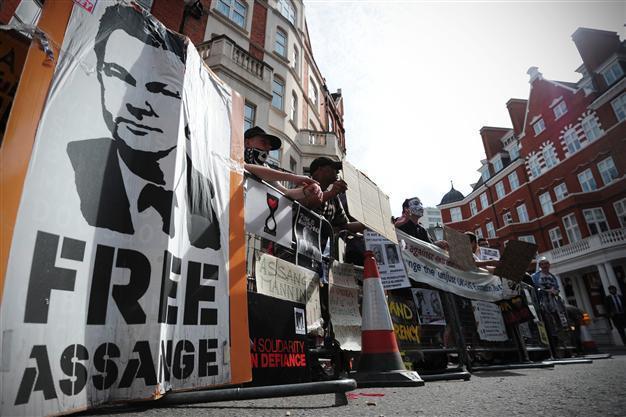WikiLeaks founder Assange set to face world's media
LONDON - Agence France-Presse

Supporters of WikiLeaks founder Julian Assange demonstrate outside the Ecuadorian Embassy in London on August 19, 2012. AFP photo
WikiLeaks founder Julian Assange was to face the world's media Sunday from Ecuador's embassy in London where he has been holed up for two months, but the Australian risks arrest if he steps outside.As Assange prepared to make a statement due around 1300 GMT, WikiLeaks urged Sweden, which wants to question its website's founder over alleged sexual misconduct, to guarantee it would not extradite him to the United States.
"It would be a good basis to negotiate a way to end this matter if the Swedish authorities would declare without any reservation that Julian would never be extradited from Sweden to the USA," WikiLeaks spokesman Kristinn Hrafnsson told AFP by telephone.
Renowned Spanish lawyer Baltasar Garzon -- known for pursuing Chile's former dictator Augusto Pinochet and who is helping Assange's defence -- was meanwhile due to speak outside the embassy ahead of his client's appearance.
Around 50 police officers, roughly the same amount of Assange supporters and many members of the world's media were stood outside the embassy Sunday awaiting the statements.
Assange is said to be living in a small room within the building, which is situated in London's plush Knightsbridge district and round the corner from the luxury Harrods department store.
Amid a widening diplomatic row over the affair, Ecuador on Thursday granted asylum to Assange, whose website enraged the United States by publishing a vast cache of confidential US government files.
With police primed to detain him Sunday, Assange must find a way of speaking publicly without setting foot outside, raising the possibility of him being forced to speak from a balcony or lean out of a window.
WikiLeaks was tight-lipped about the logistics of Assange's planned appearance, with Hrafnsson saying what little he knew could not be discussed for security reasons.
But Britain's Foreign Office warned that the steps to the embassy were considered British territory, while police said officers would take "appropriate" action" if he strayed from the building.
Despite Ecuador providing a haven for Assange, British Foreign Secretary William Hague has said Britain had no choice but to seek his extradition.
Britain has angered Ecuador by suggesting it could invoke the Diplomatic and Consular Premises Act of 1987, which it says allows it to revoke the diplomatic immunity of an embassy on British soil and go in to arrest Assange.
Assange, 41, took refuge in the embassy on June 19 to evade extradition to Sweden. Supporters of the former hacker believe that once in Sweden he could be extradited to the United States.
Assange's mother on Sunday expressed confidence that her son would make it to Ecuador to continue his whistleblowing work.
"He's had billions of people around the world supporting him, the US and their allies are almost alone on this one and the support grows day by day," she said in an interview with Australia's ABC 24.
"It could be that the UK government decides to backtrack from this position of being the US lap dog and stands up for its own sovereignty as well as the sovereignty of Ecuador." The South American country has meanwhile received powerful backing from regional allies as they warned Britain of "grave consequences" if it breaches diplomatic security at the London embassy.
Foreign ministers from the Venezuela-led so-called Bolivarian Alliance for the People of Our America (ALBA) flew to Ecuador on Saturday to demonstrate full diplomatic support.
"We warn the government of the United Kingdom that it will face grave consequences around the world if it directly breaches the territorial integrity of the Embassy of the Republic of Ecuador in London," said a statement issued at the end of the ALBA meeting. WikiLeaks' publication of a vast cache of confidential government files has enraged the US government, while his backers fear he could be tried on espionage charges there and face the death penalty.
In 2010, WikiLeaks published hundreds of thousands of US military documents on the war in Iraq and Afghanistan, as well as diplomatic cables that deeply embarrassed Washington.
















